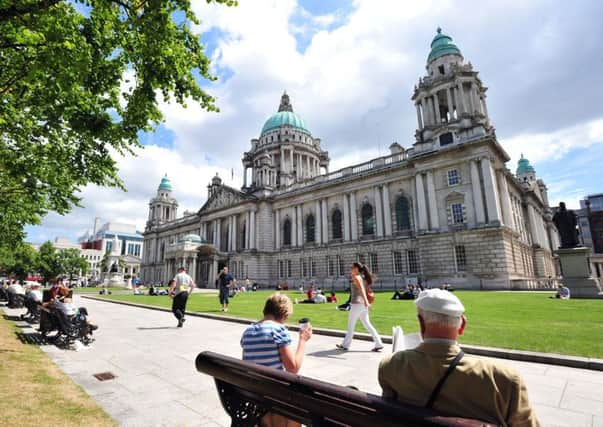Council money used to fund group with alleged dissident ties


The group in question, called Conflict Resolution Services (Ireland) – or CRSI for short – is a registered charity which works with “anti-peace
process republicans” and describes its mission as to “promote conflict resolution and reconciliation, mediation, and peace building”.
Advertisement
Hide AdAdvertisement
Hide AdIt gets money from a range of funders, including the Quaker-based Joseph Rowntree Charitable Trust.
Among those stumping up cash was Belfast City Council, which gave over £3,978 via its Good Relations Small Grant Aid Scheme in April 2016.
This was for a project entitled ‘Interface Diaries’, which according to the council aimed to “use the medium of video to create a safe space for dialogue between young people from the Twaddell/Upper Shankill and Ardoyne communities who are at risk of interface violence”.
Whilst the council funding is tiny in comparison to that from some other beneficiaries, news of it comes only weeks after the News Letter revealed the council gave £357,000 to this year’s West Belfast Festival – an event culminating in a republican music concert featuring paramilitary flags in the crowd and IRA chanting.
Advertisement
Hide AdAdvertisement
Hide AdCRSI’s accounts for 2014/2015 say it works with people who “may be at risk of punishments outside the criminal justice system”, mainly in north and west Belfast.
It seeks to “resolve and remove threat”, and succeeded in securing a “non-violent outcome” about 90% of the time, the accounts said.
Its accounts for 2016/17 give a flavour of other work, too.
“Approximately 50 ex-prisoners use our offices on a regular basis for political / social discussions,” it states.
“We are finding that this is facilitating debate amongst ‘anti-peace process republicans’ that they ordinarily mightn’t get the chance to avail of.”
Advertisement
Hide AdAdvertisement
Hide AdIt also says that “we undertook a number of residentials with ‘community activists’ to explore the current narratives that support the continuation of the ‘armed struggle’”.
It adds that it also “explored alternatives” to those violent narratives, and “whether these would be reflective of republicans within their respective communities”.
In addition, it also runs “historical tours” around the republican-dominated Ardoyne area of north Belfast.
The trustees’ report filed by CRSI with the Charity Commission also lists activities such as social media courses for community activists, sign language classes, and helping get people into jobs in businesses including Spar, Subway and a petrol station.
Advertisement
Hide AdAdvertisement
Hide AdThe commission lists CRSI as having five employees, and 25 volunteers.
SPOTLIGHT ON ORGANISATION:
Leading republican figure Carl Reilly had worked for CRSI until 2015, according to reports including The Times.
At the time, Mr Reilly was chairman of dissident organisation the Republican Network for Unity.
Mr Reilly, 42 and of Pollard Close in west Belfast, is currently facing trial accused of directing terrorism and membership of a proscribed organisation between January 2014 and October 2015 – charges which he denies.
Advertisement
Hide AdAdvertisement
Hide AdA court had been told he was allegedly recorded talking about bombings and shootings, and referred to himself as “the most f****** wanted man in Oglaigh na hEireann in the north”.
He reportedly stopped being employed by CRSI following his arrest.
However, Sean O’Reilly – who pleaded guilty to a firearms possession charge under the Firearms (NI) Order 2004 –still works for CRSI.
Mr O’Reilly, 42, and whose address was withheld by the courts, was jailed for 30 months in 2012 in relation to what one media report at the time called “a botched punishment shooting”.
Advertisement
Hide AdAdvertisement
Hide AdHe admitted attempted wounding with intent, and possession of a firearm or imitation firearm with intent to cause fear of violence.
A charge of firearm possession with intent was denied, and was left on the books.
The News Letter called CRSI’s offices and spoke to Sean O’Reilly.
He introduced himself as a staff member, but said he could not answer any questions.
Advertisement
Hide AdAdvertisement
Hide AdThe News Letter put the matter of the firearms and attempted wounding offences to him, adding that people may see it as contradictory for a charity which aims to help people under threat of extrajudicial attack to employ him, when he was involved in an extrajudicial attack.
“I won’t have any comment on that,” he said.
“As I said I mean you can ask those questions directly in relation to myself to the chairman of the board.”
He said this was CRSI director Gerry Ruddy.
Mr Ruddy in turn declined to answer questions, and referred the News Letter to the Rowntree trust.
The trust said: “Our demilitarisation funding is only for those organisations which are committed to tackling the legacy of conflict-related violence and are seeking ways to bring about positive change in their communities.”
Advertisement
Hide AdAdvertisement
Hide AdIt added: “The ongoing peace process in Northern Ireland has required engaging with those previously involved in conflict and now committed to peace, in order to facilitate a transition to purely democratic and peaceful society. Such work has been supported by many funders. To criticise the principle of this work is to criticise the foundations on which the peace process has been built.”
It did not answer follow-up questions from the News Letter.
Mr Ruddy is understood to be a former leader of the INLA’s political wing the IRSP (Irish Republican Socialist Party).
In an interview posted online in 2011 (which quotes him as referring to the “IRSP/INLA”) Mr Ruddy said he first joined the IRSP in 1981.
The following year, the INLA carried out its most infamous massacre, the Ballykelly bombing, leaving 11 soldiers and six civilians (five of whom were women) dead.
Mr Ruddy was quoted in the online interview saying he joined the IRSP’s central committee in 1983, and was its political secretary from 1997 until about 2007.